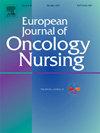基准外阴癌伤口护理实践在澳大利亚和新西兰:一项横断面研究
IF 2.7
3区 医学
Q1 NURSING
引用次数: 0
摘要
目的本研究旨在调查目前澳大利亚和新西兰外阴癌伤口护理实践,确定支持实践的证据知识,探索促进因素和障碍,并确定未来改进和研究的领域。方法采用在线横断面调查方法,收集2016年5 - 7月64名护士和医生的定性和定量数据。进行描述性统计和内容分析。一个消费者咨询小组将调查结果与生活经历联系起来。结果常见的外阴伤口护理方法包括伤口冲洗(48例,83%)和会阴干燥(40例,69%),以及导尿管(50例,86%)和引流管(33例,57%)。不使用伤口敷料是常见的(n = 41, 71%)。使用银(n = 25,39 %)、外用(n = 11,17 %)或预防性(n = 2,3 %)抗菌药物的情况较少。只有23% (n = 15)的受访者表示,组织指导和护理知识通常由从业者偏好、临床评估和专科伤口护士审查决定。报告的促成因素包括指导文件、明确的指示、临床医生的专业知识、有效的沟通和知情的患者。报告的障碍包括感染、合并症、临床医生差异、缺乏证据、系统障碍、沟通不良和伤口进入挑战。最常见的改进建议是制定基于证据的指导。确定了未来研究的四个优先领域:建立证据基础,评估患者体验,调查减少风险因素的影响,评估教育干预措施。结论通过对澳大利亚和新西兰外阴癌手术后伤口护理实践的基准,支持指导未来研究和实践改变工作的重点。本文章由计算机程序翻译,如有差异,请以英文原文为准。
Benchmarking vulvar cancer wound care practice in Australia and New Zealand: A cross-sectional study
Purpose
This study aimed to investigate current vulvar cancer wound care practices in Australia and New Zealand, identify knowledge of evidence supporting practice, explore enablers and barriers and determine areas for future improvement and research.
Methods
An online cross-sectional survey collected quantitative and qualitative data from 64 nurses and doctors between May and July 2023. Descriptive statistics and content analysis were conducted. A consumer advisory group contextualised findings within lived experiences.
Results
Common vulvar wound care practices included wound irrigation (n = 48, 83 %) and perineal drying (n = 40, 69 %), along with urinary catheters (n = 50, 86 %) and drains (n = 33, 57 %). Not using a wound dressing was common (n = 41, 71 %). Using silver (n = 25, 39 %), topical (n = 11, 17 %) or prophylactic (n = 2, 3 %) antibacterial agents were less common. Only 23 % (n = 15) of respondents reported knowledge of organisational guidance and care was commonly determined by practitioner preference, clinical assessment, and specialist wound nurse review. Reported enablers included guidance documents, clear instructions, clinician expertise, effective communication, and a well-informed patient. Reported barriers included infection, comorbidities, clinician variability, lack of evidence, systematic barriers, poor communication, and wound access challenges. The most common suggestion for improvement was the development of evidence based guidance. Four priority areas for future research were identified as; building an evidence base, evaluating the patient experience, investigating the impact of reducing risk factors and evaluating education interventions.
Conclusions
By benchmarking current wound care practices following surgery for vulvar cancer in Australia and New Zealand, priorities to direct future research and practice change efforts are supported.
求助全文
通过发布文献求助,成功后即可免费获取论文全文。
去求助
来源期刊
CiteScore
4.40
自引率
3.60%
发文量
109
审稿时长
57 days
期刊介绍:
The European Journal of Oncology Nursing is an international journal which publishes research of direct relevance to patient care, nurse education, management and policy development. EJON is proud to be the official journal of the European Oncology Nursing Society.
The journal publishes the following types of papers:
• Original research articles
• Review articles

 求助内容:
求助内容: 应助结果提醒方式:
应助结果提醒方式:


